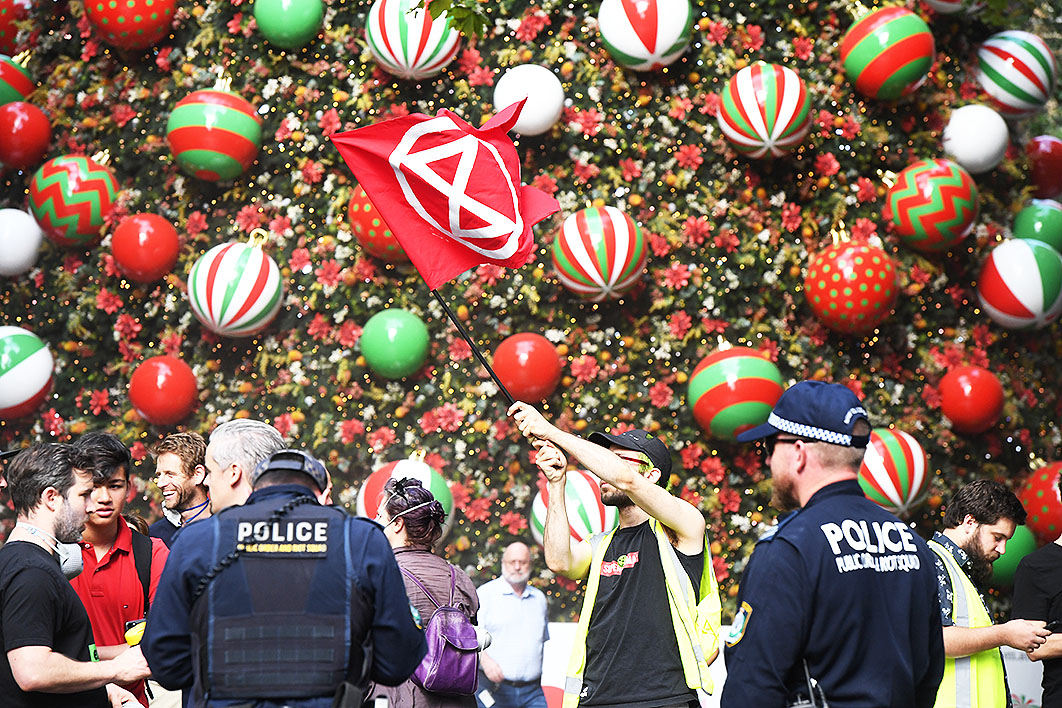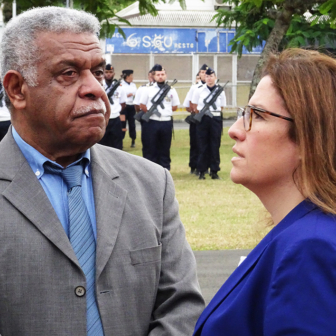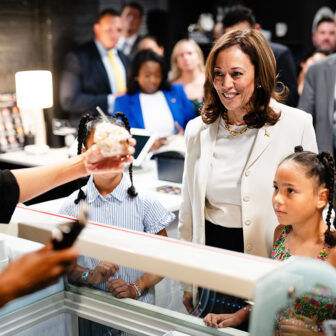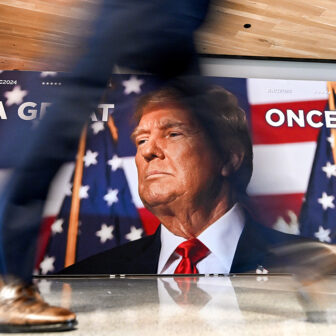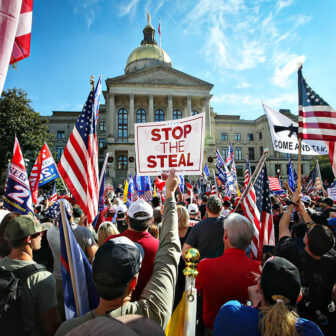In the weeks leading up to Christmas last year, as the east coast of Australia burned and smoke choked the air, a Sydney tradie named Ben Burdett was driving around his local streets searching the nature strips for council pick-ups. A carpenter by trade, he was on the hunt for the raw materials he needed to build a Santa sleigh.
Burdett — who is tall and lanky and likes a chat — lives with his wife and young family in a house littered with the happy detritus of children’s toys down the unfashionable end of Anzac Parade in Sydney’s eastern suburbs. He’s a licensed builder and runs a small contracting business. He used to row regularly for his local surf life-saving club. His kids go to Nippers.
Burdett’s searches proved fruitful. He found old tables to make the body, strips of metal to make the skis, and knocked up the sleigh on his back verandah. His young son and daughter helped to paint it: bright red, naturally. For a while the project became a popular backyard attraction for the local kids, who would come around and admire the Burdett family’s handiwork.
Then, early one morning, Burdett loaded the sleigh into a van and set off on a secret mission. As he drove north to the CBD, he was travelling along the same political road taken by advocates of nonviolent civil disobedience through the ages. Eight months earlier, in May 2019, he had joined an organisation called Extinction Rebellion.
Extinction Rebellion, known to its members as XR, was established in October 2018 by activists in Britain dismayed by the slow pace of the world’s response to climate change. By April 2019 massed ranks of XR volunteers were shutting down large parts of central London. Today it’s a global movement with chapters all over the world.
XR has three demands: it wants politicians to tell the truth about climate change; it wants net zero emissions by 2025; and it wants a people’s assembly to set policy on dealing with the threat. These are probably impossible to achieve, but they do get to the heart of the matter. The situation is urgent and little understood, and requires a rapid and radical response. Most pertinently, XR argues that the political systems invented by humans to organise their societies are logjammed in the face of this impending existential threat.
As XR founder and molecular biophysicist Gail Bradbrook told the Financial Times last year, “If your government isn’t protecting you and the future of your kids, you have a duty to rebel, and a right to rebel. When you say ‘no’ and you get on the streets and you do an act of civil disobedience, it changes your psychology. Some of us need to turn the herd.”
In Australia, as you would expect in a nation so divided over climate change policy, XR has attracted its share of criticism. After disruptive but nonviolent protests in Brisbane last year, for example, state premier Annastacia Palaszczuk denounced XR’s tactics as “sinister.” Her fellow Queenslander Pauline Hanson advocated the use of cattle prods on XR protesters. Predictably, home affairs minister Peter Dutton piled on, calling the XR protesters “fringe dwellers” who should have their welfare payments cut. Other, more sympathetic critics worry that the movement’s disruptive tactics might alienate the very people it needs to persuade.
Ben Burdett comes from a conservative background and was a Liberal voter for most of his adult life. His move into XR was gradual. “I guess it happened when I read that half the Great Barrier Reef was bleached… and I thought, ‘Gosh, this will surely be a tipping point to change things.’ And it didn’t: nothing changed.”
In 2017 he was one of hundreds of people who spelt out the words “Stop Adani” on Bondi Beach. “It was the first time I’ve ever dabbled in any sort of rally.”
And then there’s his aunt, who lives back in his hometown, Batemans Bay, on the NSW south coast, and regularly posts on Facebook denying climate change. To prepare himself for the traditional Christmas dinner argument, Burdett started “seeking out objective and reliable information” — from NASA, the CSIRO and the Intergovernmental Panel on Climate Change. Suddenly the Facebook algorithm started filling his newsfeed with all the woes of the world’s climate.
“And that was the ‘Oh, shit’ moment. I actually didn’t quite realise how bad it was. I just resolved to do what I could about it, for my kids really.”
Burdett first learnt about XR from a TV news report. In May 2019, after tracking it down online, he went along to a training day and immediately felt comfortable with the group’s ideas and inspired by its aims. “I think the whole thing is structured towards trying to set an example of where we want to be as humanity,” he says.
When he volunteered to take part in XR, Burdett realised he was making a big step. One of the first questions they ask you at introductory meetings is: are you willing to get arrested? “And I thought, ‘Wow.’ These guys are a bit more extreme than where I’m at.” But after a moment’s reflection, Burdett found himself saying yes.
A few months later, on 17 October last year, XR dragged a big pink water tank into the middle of the traffic on Broadway, a busy thoroughfare in Sydney not far from the ABC. With four other activists, Burdett jumped up and locked himself in. “It was like a bank heist. One of the most anxious and exciting, and terrifying, things I’ve ever done.”
The media soon arrived, and then the cops, who dragged the tank off the road and arrested its occupants. Getting arrested was “horrible, but also an excellent experience,” both stressful and uplifting. It reminded him, he tells me, of attending the births of his children.
Burdett was charged with “not complying with police direction regarding road closure.” which can carry a fine of over $2500. He was let off with just a warning at his sentencing hearing on 2 March.
Ben Burdett delivered his handcrafted sleigh to Sydney’s Pitt Street where it bisects Martin Place, not far from the offices of Channel Seven. It was 20 December and Australia was in the depths of its Black Summer. Two days earlier, Rural Fire Service volunteers Geoffrey Keaton and Andrew O’Dwyer had been killed near Buxton when a tree fell in the path of their truck.
About one hundred other XR members had also converged on the civic heart of Sydney. The action they were about to take had taken months to plan. An XR choir was coming in from the Blue Mountains. Someone else was bringing a pile of charcoal to fill the sleigh. Other XR members intended to conduct a “die in” by lying down on the flagstones of Martin Place and doing their best impression of corpses created by the impact of climate change. A team was standing by to unfurl a road-blocking banner. Wearing hi-vis vests were several XR media and police liaison officers.
In the white van there was also a huge papier-mâché puppet head that would be worn by one of the “arrestables,” as they’re called in XR jargon. The head — which looked a lot like the prime minister in a red Santa Hat — would be worn by the sleigh’s commander, “Santa Sco-Mo.” Waiting at Martin Place, there were six XR volunteers dressed as reindeer. All of them had made a commitment to get arrested.
“Building the sleigh was the easy bit. There is so much organisation,” Burdett explains. “But in the end, it was all done with military precision.”
In just a few minutes the banner was unfurled, the traffic on Pitt Street was stopped, the sleigh with its cargo of charcoal was guided on to the road, and the reindeer had glued themselves to the asphalt.
When the police arrived twenty minutes later, they arrested the prime minister’s yuletide avatar but couldn’t fit his head in the paddy wagon. Then they discovered that Burdett had cunningly built a rigid bike lock into the design, which secured the XR protester to the puppet head. More time was spent cutting it off.
As you might expect, the response of Sydney’s normally jaded commuters was mixed. Many put their heads down, ignored the commotion, and headed for work. But when the deployment was finished, says Burdett, many in the gathered crowd broke into spontaneous applause. He tells me that a young woman who watched the scene unfold from her desk in an overlooking office tower later joined XR. But several blocked drivers aggressively approached the protesters, who remained silent and calm, and swore at them.
The “Sleigh Action” held up the traffic for a couple of hours and made the TV news. Burdett planned to spend the rest of the action handing out flyers. “But when I ran out of flyers — and this is way outside my comfort zone — I ended up like being a town crier. As people were walking down the hill of Martin Place, I was literally telling them at the top of my voice the facts about climate change.”
Many members of XR say that being part of the movement helps allay the anxiety they feel about climate change. “I really feel it’s helping me grow as a person,” Burdett tells me. “You’re getting this trickle in of people from every kind of background. It’s a real melting pot [and] it really does foster this caring community, which is really refreshing.”
Just as Extinction Rebellion has acquired some predictable detractors, it has also acquired some interesting supporters. David King, former scientific adviser to Tony Blair and a knight of the realm, has made public comments in favour of XR. Another knight, Christopher Hohn, a billionaire hedge fund manager who wants to stop investing in carbon-polluting industries, has donated £50,000 to the group’s UK branch.
Farhana Yamin, a respected British environmental lawyer and a lead author on several Intergovernmental Panel on Climate Change reports, went all the way and got herself arrested at an XR demonstration last year after she glued her hands to the steps of Shell’s main office in London.
And what is all this effort achieving? XR holds to its three aims sincerely, but more broadly its strategy is to shift the Overton window on climate change. Named after the American conservative Joseph Overton, who first identified it, the Overton window describes how, at any given moment, there are policies that are seen to be sensible and acceptable by mainstream voters, and others — outside the frame — that are considered too radical. The trick is getting the window to shift so that the radical solution is considered the sensible thing to do.
The massive XR demonstrations last year in Britain resulted in the British parliament passing a non–legally binding emergency motion that recognised the climate crisis. Not long afterwards, MPs also passed a legally binding target of net zero greenhouse gas emissions by 2050, making Britain one of the first countries to do so.
“The [2050] date is nowhere near soon enough,” Yamin wrote in Nature, “but this fast-tracking would never have happened without XR’s disruptive protests and the global student strikes on which they built, led by campaigner Greta Thunberg.” In Britain, at least, where XR is most successful, the Overton window had shifted a little way towards climate change realism.
On New Year’s Day, just ten days after the XR action in Martin Place, Burdett’s family found itself in the path of Australia’s bushfire emergency.
Burdett’s mother lives in Pambula, on the far south coast of New South Wales, and the fire front was heading towards her home. By this point, the highway south was closed, so Burdett had to catch a local flight to be with her. He spent two frantic days helping prepare her house against the threat of fire.
“I’ve never experienced anything like it,” he says. “On that Saturday down in Pambula, the smoke came in at about 5pm, and within fifteen minutes it went as black as midnight.”
In the end, the fire didn’t make it to Pambula. But a few days later Burdett’s sister’s house in Wingello, a small town in the southern highlands, was burnt down.
Recently, Malcolm Turnbull — Darling Point grandfather, multimillionaire and former PM — gave a speech to energy industry executives. He said it was time to end the “false” and “misleading” debate over whether a goal of net zero emissions is optional.
“Well, I suppose it is optional, but it’s an option you don’t want to miss, because if we do miss it, we know what the consequences are,” he said, “The fires of this last summer will seem like a very, very mild experience compared to what a 3°C [warmer] world will look like. It is an absolutely unthinkable, catastrophic, apocalyptic scenario.”
Turnbull is probably closer to Ben Burdett’s position on climate change than he is to the views of many of his former colleagues in the government. But until Australia gets a prime minister who is willing and able to make such remarks while still in office, the Overton window will not have shifted enough, and Ben Burdett will still be knocking up Santa sleighs in his backyard. •
